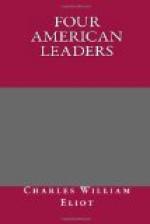In no subject which he discussed does the close connection between Channing’s theology and his philanthropy appear more distinctly than in education. He says in his remarks on education: ... “There is nothing on earth so precious as the mind, soul, character of the child.... There should be no economy in education. Money should never be weighed against the soul of a child. It should be poured out like water for the child’s intellectual and moral life.” It is more than two generations since those sentences were written, and still the average public expenditure on the education of a child in the United States is less than fifteen dollars a year. Eastern Massachusetts is the community in the whole world which gives most thought, time, and money to education, public and endowed. Whence came this social wisdom? From Protestantism, from Congregationalism, from the religious teachings of Channing and his disciples. Listen to this sentence: “Benevolence is short-sighted indeed, and must blame itself for failure, if it do not see in education the chief interest of the human race.”
It is impossible to join in this centennial celebration of the advent to Boston of this religious pioneer and philanthropic leader without perceiving that in certain respects the country has recently fallen away from the moral standards he set up. Channing taught that no real good can come through violence, injustice, greed, and the inculcation of hatred and enmities, or of suspicions and contempts. He believed that public well-being can be promoted only through public justice, freedom, peace, and good will among men.
He never could have imagined that there would be an outburst in his dear country, grown rich and strong, of such doctrines as that the might of arms, possessions, or majorities makes right; that a superior civilization may rightly force itself on an inferior by wholesale killing, hurting, and impoverishing; that an extension of commerce, or of missionary activities, justifies war; that the example of imperial Rome is an instructive one for republican America; and that the right to liberty and the brotherhood of man are obsolete sentimentalities.
Nevertheless, in spite of these temporary aberrations of the public mind and heart, it is plain that many of Channing’s anticipations and hopes have already been realized, that his influence on three generations of men has been profound and wholly beneficent, and that the world is going his way, though with slow and halting steps.
His life brightened to its close. In its last summer but one he wrote: “This morning I plucked a globe of the dandelion—the seed-vessel—and was struck as never before with the silent, gentle manner in which nature sows her seed.... I saw, too, how nature sows her seed broadcast.... So we must send truth abroad, not forcing it on here and there a mind, and watching its progress anxiously, but trusting that it will light on a kindly soil, and yield its fruit. So nature teaches.”




